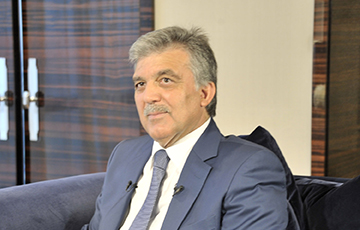ID :
380655
Wed, 09/16/2015 - 15:31
Auther :
Shortlink :
http://m.oananews.org//node/380655
The shortlink copeid
Gul hails Bahrain-Turkey ties

Manama, Sept. 16 (BNA): Turkish former President Abdallah Gul said that his visits to Bahrain are always a good opportunity to boost friendship and to share views with its leaders.
"I am very pleased to be back in Bahrain. I am happy whenever I am in Bahrain and I have expanded my friendships," he said.
Gul who was president of Turkey from 2007 until 2014 said that he still recalled with appreciation the "warm and gracious hospitality extended by His Majesty the King, the Prime Minister and the Bahraini people" when he was on a state visit to the kingdom in 2009.
"Bahrain is a country which I have always appreciated for successfully combining its identity and its traditional values with the necessities of the modern world," Gul said. "His Majesty King Hamad’s reformist efforts for the good of his own people and for peace in the region have been most remarkable," he said, adding that Bahrain offered "the best conditions and atmosphere to work for conflict prevention, multilateral diplomacy, peace-building and related fields in the Middle East, which are very much needed today."
He expressed his sincere condolences to Bahrain over the death of BDF men while performing their duty as part of the Arab coalition in support of the legitimacy to restore security and stability in Yemen.
"Terrorism is a problem hitting people everywhere and it is causing a lot of pain and sufferings," he said. "When I had the great honour of addressing the Bahraini parliament in 2009, as the first ever foreign president to do so, I talked about threats menacing the region. The issues I covered were the Palestine issue, the situation in Iraq, the nuclear-free zone issue, and cooperation schemes for a better future of the region. Unfortunately, since then, the landscape has changed. The problems have now spread across a wider area. Today, unfortunately, the whole region is going through a highly critical situation. We have dramatic situations in many countries and we have to deal with the humanitarian situation of refugees. Today, the plight of millions of people living in the conflict area, the refugees and the internally displaced persons, represents a great humanitarian tragedy. There is an urgent need to bring peace back to the region and we are aware it is not an easy task because the problem is very deep and we have to work very hard to find solutions," Gul said.
Joint work is needed to address shared concerns within an atmosphere of mutual trust, he said.
"We can help one another and work together, but we must make sure there is trust and there is confidence. All of us have to respect the territories of other countries. We must respect their regimes and we must not interfere in their domestic affairs. Countries must learn from what happened in the past and not repeat mistakes.We need peace so that we can devote our energy and resources to development. The nuclear agreement should herald positive changes and motivate Iran to establish more constructive relations, based on confidence, with its neighbours, he said.
"Now that there is a nuclear agreement, there is a chance that Iran will not be the same and there should be peace in the wider region. After the deal, countries should come together. Iran was thinking differently, but now it should think more constructively," he said.
Gul said that while he considered Islam phobia as a negative attitude towards Islam, he urged people in the Muslim world to engage into introspection and reflect on their attitudes and approaches.
"We must not turn a blind eye and just blame the others for Islam phobia. Unfortunately, people who do not in fact represent Islam have given the others so many pretexts. Some of these people do not even practice Islam, but they used Islamic words and connotations under the umbrella of Islam. Other countries exploited the situation mainly for populist purposes," he said.
"Unfortunately, Muslims living in Western countries have come under tremendous pressure as a result of this Islam phobia. Muslims should not give them pretexts. Muslims need to look deep inside themselves and try to understand why they are not as successful as before. This is an effort that all people should undertake, but all leaders, and not just political leaders, but also social and religious leaders as well as scholars should lead the people into trying to understand why there are failures, why we are not achieving the positive results that we want," he said.





